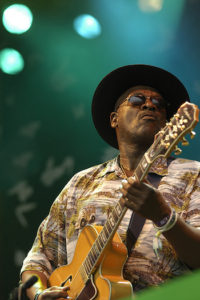
Taj Mahal
Taj Mahal was born on this date in 1942. He is a Black musician, singer, artist, and producer.
Born Henry St. Claire Fredericks in Harlem, NY, he grew up in Springfield, Massachusetts. His father was a jazz pianist/composer/arranger of Caribbean descent, and his mother was a gospel-singing schoolteacher from South Carolina. He was raised in a home that encouraged respect and pride in their roots. His father had an extensive record collection and a short-wave radio that brought sounds globally to his son's ears. His parents also started him on classical piano lessons. In addition to piano, he learned the clarinet, trombone, harmonica, and voice.
Later, he discovered his stepfather's guitar and became serious about it when Lyndon Perry, an accomplished young guitarist from North Carolina, moved in next door. Perry played a Piedmont style and the styles of Muddy Waters, Lightnin' Hopkins, John Lee Hooker, and Jimmy Reed. Springfield, in the '50s, gave Mahal the environment to explore where all the different forms of music he was hearing came from, how they got to their current positions, and how they influenced each other. He studied older forms of Black music, including folk music material that the record companies primarily ignored. While attending the University of Massachusetts at Amherst as an agriculture student in the early 1960s, he transformed himself into the Taj Mahal. This inspiration came to him in a dream.
He began playing with the popular U.Mass. party band The Elektras, then left Massachusetts in 1964 for the blues-heavy L.A. club scene. He formed The Rising Sons with Ry Cooder, Ed Cassidy, Jesse Lee Kinkaid, Gary Marker, and Kevin Kelly. At the Whiskey A-Go-Go in Los Angeles, The Rising Sons opened for Otis Redding, Sam the Sham, The Temptations, and Martha and the Vandellas. During this time, he heard, met, and played with Howlin' Wolf, Muddy Waters, Junior Wells, Buddy Guy, Louis, Dave Meyers, Sleepy John Estes, Yank Rachel, Lightin' Hopkins, Bessie Jones, the Georgia Sea Island Singers, Hammy Nixon, and others.
His experiences were shown on three hugely influential records: Taj Mahal (1967), The Natch'l Blues (1968), and Giant Step/De Old Folks at Home (1969). In 1970, Mahal traveled to Spain to carve out his musical niche with a string of adventurous recordings throughout the '70s, including Happy to Be Just Like I Am (1971), Recycling the Blues and Other Related Stuff (1972), the soundtrack to the movie Sounder (1973), Mo' Roots (1974), Music Fuh Ya' (Music Para Tu) (1977), and Evolution (The Most Recent) (1978). Mahal's recording output slowed during the 1980s as he toured and immersed himself in the music and culture of his new home in Hawaii. Still, he released Taj (1987) and three children's albums.
He returned to a full recording and touring schedule in the 1990s, including the musical scores for the Langston Hughes/Zora Neale Hurston play Mule Bone (1991) and the movie Zebrahead (1992). Later in the decade, Dancing the Blues (1993), Phantom Blues (1996), An Evening of Acoustic Music (1996), and the Grammy Award-winning Se-or Blues (1997). He continued to explore world music with World Music in 1993. He joined Indian classical musicians on Mumtaz Mahal in 1995, recorded Sacred Island, a blend of Hawaiian music and blues, with The Hula Blues in 1998, and paired with Malian kora player Toumani Diabate for Kulanjan in 1999.
Since 2000, Taj has released a second Grammy-winning album, Shoutin' in Key (2000), and recorded a second album with The Hula Blues (2003's lush Hanapepe Dream). A self-taught musician, Taj Mahal plays more than 20 instruments.
As of 2019, Taj Mahal has received three Grammy Awards (ten nominations) over his career. 1997 (Grammy Award) Best Contemporary Blues Album for Señor Blues, 2000 (Grammy Award) Best Contemporary Blues Album for Shoutin' in Key, 2006 (Blues Music Awards) Historical Album of the Year for The Essential Taj Mahal, 2008 (Grammy Nomination) Best Contemporary Blues Album for Maestro, 2018 (Grammy Award) Best Contemporary Blues Album for TajMo
All Media Guide
1168 Oak Valley Drive
Ann Arbor, MI 48108 USA
ASCAP Biographical Dictionary
R. R. Bowker Co., Copyright 1980
ISBN 0-8351-1283-1